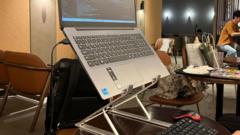In Seoul's upscale Daechi neighborhood, cafe owner Hyun Sung-joo grapples with a growing trend among young South Koreans known as 'Cagongjok'. This term describes students and workers who occupy cafe seats for long hours, often setting up elaborate workstations with multiple devices. Hyun recalls one customer who took over a table with two laptops and a six-port charger for the whole day, prompting him to block power outlets to deter such behavior.
As these cafe dwellers crowd locations at unprecedented levels compared to coffee shops in Western countries, Starbucks Korea recently issued new guidelines to manage extreme setups—like desktop monitors or unattended spaces—that hinder other customers. Staff are instructed to provide guidance rather than evict patrons outright, addressing past theft issues from unattended belongings.
In bustling cafes, such as one in Gangnam, students continue to fill tables, with some staying from morning until night, leaving items unattended while taking breaks. These guidelines, however, have led to mixed reactions: while some patrons welcome the changes as necessary for restoring balance, others criticize them as excessive overreach.
The growing presence of Cagongjok reflects a cultural shift, particularly among the Gen Z demographic; a significant portion studies at cafes weekly. With South Korea witnessing a boom in coffee shops—nearly 100,000 current locations—the challenge of "seat hogging" is prompting some independent cafes to enforce stricter time limits for patrons studying.
Not all cafe owners oppose Cagongjok. Many appreciate considerate customers who make additional purchases during their lengthy stays. Others, like a cafe owner in Jeonju, have opted for firm policies after enduring complaints about monopolized seating, installing "No Study Zone" signs to maintain a balance between conversation and individual study.
The question arises: why are cafes preferred over libraries or home settings? For individuals like Yu-jin Mo, the cafe environment feels safe and comfortable, assisting in overcoming past traumas. Professor Choi Ra-young from Ansan University attributes the phenomenon to societal pressures faced by students and job seekers. She advocates for the creation of inclusive workspaces that accommodate Cagongjok culture without inconveniencing others, emphasizing the need for a balance between productivity and community in South Korean cafes.

















